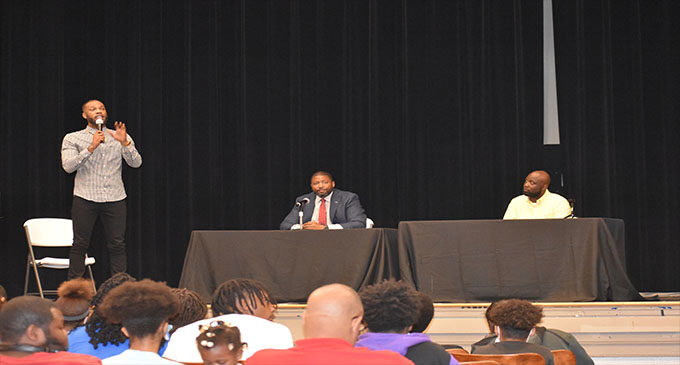Youth Empowerment Program panel offers advice on common issues to students
From left to right: Brian “B Daht” McLaughlin, emcee of the panel discussion; Asst. Chief William Penn; and DeShea Blake, training education coordinator and director of the Youth Empowerment Program for Habitat Forsyth.

If you find yourself in a violent situation, do not fight back. Instead, get away if at all possible.
That’s the advice Winston-Salem Assistant Police Chief William Penn gave students at a school violence discussion on June 7 in the Carver High School auditorium. The program, sponsored by the Youth Empowerment Program of Habitat for Humanity of Forsyth County, focused on the most common issues faced by students in the Winston-Salem/Forsyth County school system, which are assaults and weapons on campus.
The way he advises his own son has changed dramatically in the last five years, Penn said.
“When I was being raised, my dad said if someone hits you, you hit back,” Penn said. “I have an 18-year-old son, and in the last five years, I had to sit back down with him and we had to change our strategy. I tell my son that if he’s in a situation and he’s backed in a corner, he needs to do what it takes to get out of that situation.”
In the United States today, there are 120 guns for every 100 people, Penn said. Guns are everywhere, and people may choose to use them to solve conflicts violently. A split-second decision can be the difference between life and death. “Sometimes getting out of the situation is going to save your life.”
Social media only adds to school violence because it allows arguments and threats to continue and worsen, Penn said. Another problem, he added, is the “no snitching” culture.
“When you have guns in your school, please, kids, you have to know nothing good will come of that,” Penn said. “If you know of somebody with a gun in your school, there’s a Crimestoppers number where you don’t have to give up who you are, and you will get $500. … You’re doing it for your community. You’re doing it for the person sitting next to you. You HAVE to report that. I don’t know how we’ve allowed someone to tell us no snitching is the answer, and then by not snitching, we have a lower quality of life. How does that make sense?”
There are other situations in which one bad decision can lead to a long detour into the criminal justice system, Penn said. He cautioned students that they could be charged with sex offenses for sharing pornographic photos and videos on their phones and social media.
“These are the types of crimes that will follow you a very long time. There are civil ramifications for that, too. You can be sued. Your parents can be sued. Seriously, if someone sends you something like that, they are not doing you any favors. They’re putting you in a bind.”
The school violence discussion followed an evening of award presentations and a celebration of the end of the school year for 18 YEP participants. Teaching students ages 12-17 how to deal with life situations is a vital component of the YEP program, said DeShea Blake, training educator for Habitat Forsyth and director of YEP.
During the school year, YEP offers age-appropriate activities about topics such as career choices, financial literacy and car maintenance. YEP participants also do community service and have taken field trips to the International Civil Rights Museum in Greensboro, a Harlem Globetrotters game, and the MarineQuest program affiliated with UNC-Wilmington. The program is free to participants, and students can join at any time.
This summer, YEP will offer a coding/robotics camp and separate leadership camps for boys and for girls. For more information about the camps and YEP, contact Blake at TrainingEd@habitatforsyth.org.









